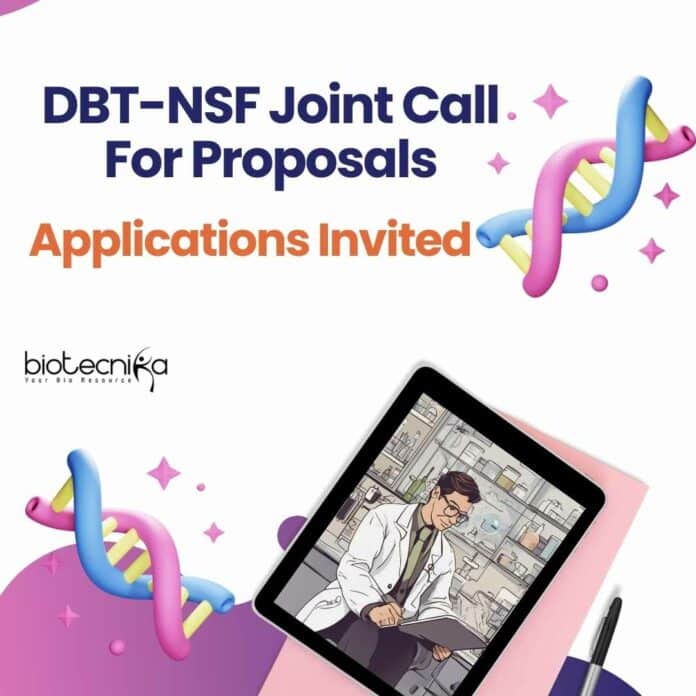DBT-NSF Joint Call For Proposals – Applications Invited
DBT-NSF Joint Call For Proposals – Applications Invited. Interested and eligible applicants can check out all of the details on the same below:
Department of Biotechnology
Global Innovations Directorate
(DBT – NSF Joint call for proposals)
(LAST DATE OF PROPOSAL SUBMISSION – 11TH APRIL, 2024)
Guidelines for Submitting Collaborative Proposals under Department of Biotechnology (DBT), Government of India and U.S. National Science Foundation (NSF) Collaborative Research Opportunities
Department of Biotechnology (DBT), Government of India and National Science Foundation (NSF) of U.S have signed an Implementation Agreement (IA) on research Cooperation. This Implementation Arrangement provides a framework to encourage collaboration between U.S. and Indian research communities and sets out the principles by which joint activities might be supported. Through this research agency partnership, U.S. researchers may receive funding from NSF and India researchers may receive funding from DBT respectively. This NSF-DBT collaborative research opportunity focuses specifically upon discoveries and innovations in areas of mutual interest to support advancing knowledge, technologies, and innovation that advance biotechnology and promote the bioeconomy.
Proposals may be submitted that address complex scientific challenges and innovate novel solutions that leverage advances in synthetic and engineering biology, systems and computational
biology, and other associated fields that are foundational to developing future biomanufacturing solutions and advance the bioeconomy. Examples of challenge areas include but are not limited to:- Development of innovative tools, technologies, and resources for genome engineering, and genome manipulations of plants and other organisms of relevance in synthetic and engineering biology
- Designing organelles (ribosomes, mitochondria, membranes, regulatory modules, molecular machines, etc.), or synthetic components that could be integrated into cells or cell-like systems
- Understanding the biological principles for cell programming and strain engineering in microbes and host (plant) microbe interactions in phytobiomes and rhizosphere
- Engineering DNA, RNA, and protein/enzyme
- Modelling of metabolic networks and interactions among networks
- Designing host expression system for recombinant proteins
- Engineering novel microbial chassis
- Developing and applying synthetic gene circuits
- Engineering novel plant chassis
- Predictive models of cells and subcellular systems that support mechanistic understanding and engineering design
Proposals submitted to this opportunity may focus on the development of foundational tools that would support all application spaces or focus on specific applications. Examples of application domains of interest include:
- The production of smart proteins and high value small chemical molecules of industrial importance
- Development of climate resilient crops as well as plants tailored as feedstocks
- Engineering microorganisms for enhanced CO2 capture and conversion abilities
- Expanding protein functional diversity to expand the biochemical diversity for bioeconomy applications
- Engineering of microbial communities that reduce fertilizer use, enhance plant productivity, improve sustainability, and/or have the ability to improve the circularity of biomanufacturing production
The list of examples is intended to be illustrative, not exhaustive.
Through a research agency partnership, NSF and DBT will allow investigators from both countries to collaborate to write a single proposal that will undergo a single review process at NSF, the Coordinating Agency.
The collaborative opportunity described in the Dear Colleague Letter (DCL) remains in effect until archived.
Eligibility Criteria of Principal Investigators for DBT Support:
- Any Indian National holding a regular position in any Indian academic and scientific research institutions (Govt./Private) may apply. This call is open to all applicants eligible for Govt. funding. The research institutions must be recognized by DSIR as a Scientific and Industrial Research Organization (SIRO). Private institutions/ NGOs should also be registered with Darpan Portal of NITI Aayog. There should be at least one co-investigator from each participating institute and either one of the PI or Co-PI should have remaining service in co-terminus to the duration of the project.
- Number of proposal submission for Indian investigators as PI is limited to one proposal while they can involve as Co-PIs in maximum of two proposals.
- The Indian scientists who are in any way involved in the implementation of two or more projects that were previously supported by the DBT (International Cooperation Programme) and that are not expected to be completed before 31st March, 2024 are also not eligible to be a member of the research team.
Guidelines:
- The proposed work submitted under an NSF-DBT collaboration must represent an integrated collaborative effort. The Project Summary and Project Description of the proposal must include a description of the collaboration, including an explanation of the role(s) of the India collaborator(s) and an explanation of how the team will work together. The Project Summary, Project Description, and references used must be exactly the same when submitted to both NSF and DBT.
- The proposal must describe the intellectual merits of the proposed research, including the value of the international collaboration and the anticipated broader impacts (including societal benefits) of the effort. As broader impacts are a review requirement for both NSF and DBT, the proposal should include relevant societal benefits as well.
- The proposal should describe the full proposed research program, including the total U.S. and Indian resources that will be part of the project. NSF investigators should indicate only the NSF expenses in the NSF budget. DBT investigators should indicate only the DBT research expenses on the DBT budget form. The DBT budget and budget justification must be included in the NSF proposal as a Supplementary Document. The Budget Justification section of the NSF proposal should clearly differentiate the NSF budget from any similar funds requested by the India team and justify the full NSF project budget. Proposals that request duplicative funding may be returned without review.
- The proposal may be considered for funding for 3 years with a maximum budget limit up to 25 million Indian Rupees (Rs. 2.50 Crores) by DBT.
- DBT investigators will submit their full proposal as per DBT guidelines (https://dbtindia.gov.in/) through DBT eProMIS: https://dbtepromis.nic.in/, DBT-NSF portal under Global Innovations Directorate (International Cooperation Bilateral Program).
- Proposals must be submitted to a participating NSF program following the requirements outlined in this DCL as well as the guidance contained in the relevant program solicitation or program description. As specified in the relevant funding opportunities, proposers are to comply with the proposal preparation requirements outlined in NSF’s Proposal and Award Policies and Procedure Guide (PAPPG – https://www.nsf.gov/publications/pub_summ.jsp?ods_key=pappg) and submit the proposal through Research.gov (https://www.research.gov/research-web/) or Grants.gov (http://grants.gov). Where programs have a solicitation, the requirements in the solicitation take precedence over those listed in the PAPPG.
- By submitting, PIs and their organizations agree that NSF may share proposal materials, unattributed reviews and information pertaining to the review process with DBT.
- If applicable, for NSF investigators, involvement in a joint international proposal will count towards the limit on the number of submissions in which an individual may participate as PI, co-PI, or senior personnel, as specified in the relevant program solicitation to which the proposal is submitted.
- The title of the proposal should be prefixed with “NSF-DBT:”, after any solicitation-specific title requirements, to indicate that the document is to be considered by both NSF and DBT.
- If the proposal is arranged as separate submissions from multiple U.S. organizations, it must be submitted via Research.gov and the title of the proposal should begin with “Collaborative Research:” followed by “NSF-DBT”. Do not check “separately submitted collaborative proposal” unless more than one U.S.-based organization will be submitting the same proposal for separate funding (i.e., the “separately submitted collaborative proposal” check box only applies if there is more than one collaborating organization on the U.S. side, each submitting the same proposal).
- For proposals submitted to NSF, DBT investigators should be listed in the Overview section of the Project Summary as “Non-NSF funded collaborators.” This listing is for administrative purposes and is not intended to characterize the level or value of the contribution of DBT investigators to the project. Guidance on information to provide for “Non-NSF funded collaborators” is below.
- Biographical Sketch – Required. The biographical information must be clearly identified as “non-NSF funded collaborators” biographical information and uploaded as a single PDF file in the Other Supplementary Documents section of the proposal. Use of a specific format is not required.
- Current and Pending (Other) Support – Not required for DBT investigators.
- Results from Prior NSF Support – Not required for DBT investigators.
- Collaborators and Other Affiliations (COA) information must be provided through the use of the COA template, identified as “non-NSF funded collaborators” information, and uploaded as a PDF file in the Single Copy Documents section of the proposal.
- NSF investigators should indicate only the NSF expenses in the NSF budget. DBT investigators should indicate only the DBT research expenses on the DBT budget form. The DBT budget and budget justification must be included in the NSF proposal as a Supplementary Document including expenses in U.S. dollars. The Budget Justification section of the NSF proposal should clearly differentiate the U.S. budget from any similar funds requested by the India team and justify the full U.S. project budget requested. Proposals that request duplicative funding may be returned without review.
- The Data Management Plan must include mechanisms for sharing and archiving data including experimental data, results, and software developed, in accordance with NSF and DBT policy and U.S. and India statutes, with consideration of associated privacy and security aspects. Please review and follow the program specific requirements for data management plans.
- For projects involving human subjects/participants or vertebrate animals, investigators should follow both NSF and DBT policies, submitting documentation to each as appropriate.
- Letters of collaboration may be included; however, they must comply with the requirements in PAPPG Chapter II.D.2.i.
- For DBT Investigators, there are limits on the number of submissions per NSF-DBT call for proposals:
- PIs can submit one proposal.
- Co-PIs can be involved in up to two proposals.
- DBT Investigators involved in the implementation of two or more projects that were previously supported by the DBT International Cooperation programme and that are not expected to be completed before 31 March 2024 are not eligible to be a member of a research team. This limitation does not apply to projects supported by other divisions or groups within DBT.
Instructions for submission of proposal in DBT through e-ProMIS:
- Log on to eProMIS portal of DBT (https://dbtepromis.nic.in/Login.aspx) and register (For new user). After registration, log in and submit the joint project proposal in prescribed format under under DBT-NSF Portal, Global Innovations – Bilateral Programme.
- Before filling up the form Indian applicants are advised to carefully go through the Relevant Advertisement published at the DBT Website (https://dbtindia.gov.in/) and also available under proposal formats in the e-ProMIS Portal after logging in the portal site.
- To save time and avoid data loss, please download the appropriate proposal format and fill all the information required as per the format as a Word and PDF file and then keep it ready for upload during submission of mandatory documents.
- Click on “Submit proposals” link which would take to a page seeking multiple information starting with – General information, Principal investigator etc.:
- After filling all above particulars, there is provision to preview your details before final submission of application form on clicking on “Preview” button. Preview page will display all facts/particulars that have mentioned on entry time. If the applicant is sure with filled details, then click on “Submit” button to finally push data into server.
- Applicants are advised to carefully fill in and verify the details required for the online application themselves, as no change will be possible/ entertained after clicking the FINAL SUBMIT BUTTON.
Documents Required for Indian Investigators:
- Complete Project Proposal – DBT- NSF Joint Call for Proposals (Annexure I)
- Certificate from Investigator(s) (Annexure II)
- Endorsement from the Head of Organization (on letter head) (Annexure III)
- Conflict of Interest (Annexure IV)
- Biodata of entire project team members (Max: 3 pages per Investigator) including date of superannuation / tenure completion, their affiliation, date of birth, field of specialization, highlights of academic and research activities / awards, significant accomplishment etc., in a single pdf file.
Contact Details:
DBT, Govt. of India
Dr. Shahaj Uddin Ahmed
Scientist ‘F
Global Innovations Directorate
Department Biotechnology
Ministry of Science & Technology
CGO Complex, Block-2,
Lodhi Road, New Delhi
E-mail: [email protected]
U.S. NSF
Cate Flanley, PhD
Program Director
Office of International Science and Engineering,
National Science Foundation E-mail: [email protected];
Editor’s Note: DBT-NSF Joint Call For Proposals – Applications Invited. Please ensure you are subscribed to the Biotecnika Times Newsletter and our YouTube channel to be notified of the latest industry news. Follow us on social media like Twitter, Telegram, Facebook




































